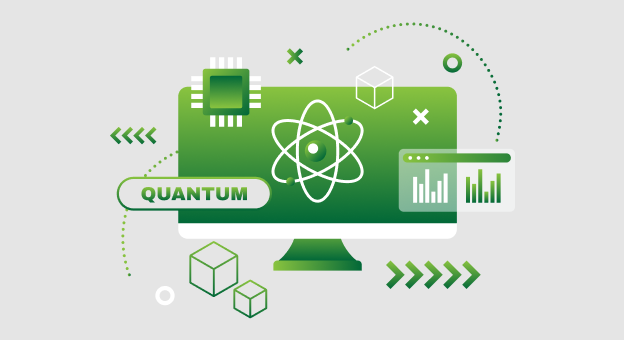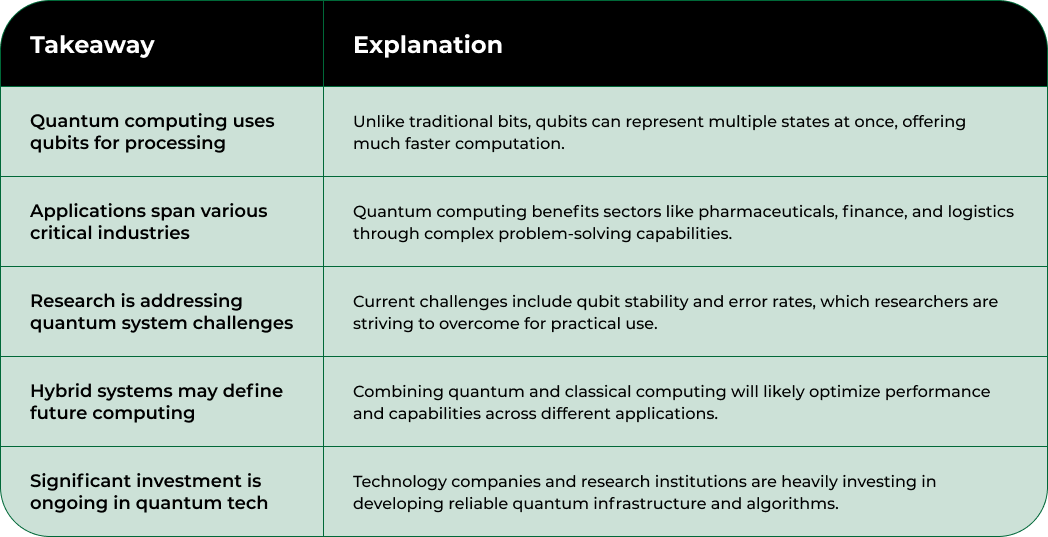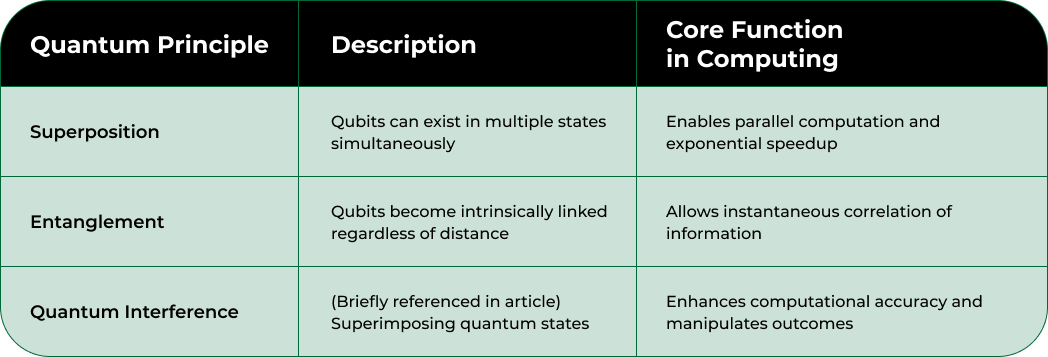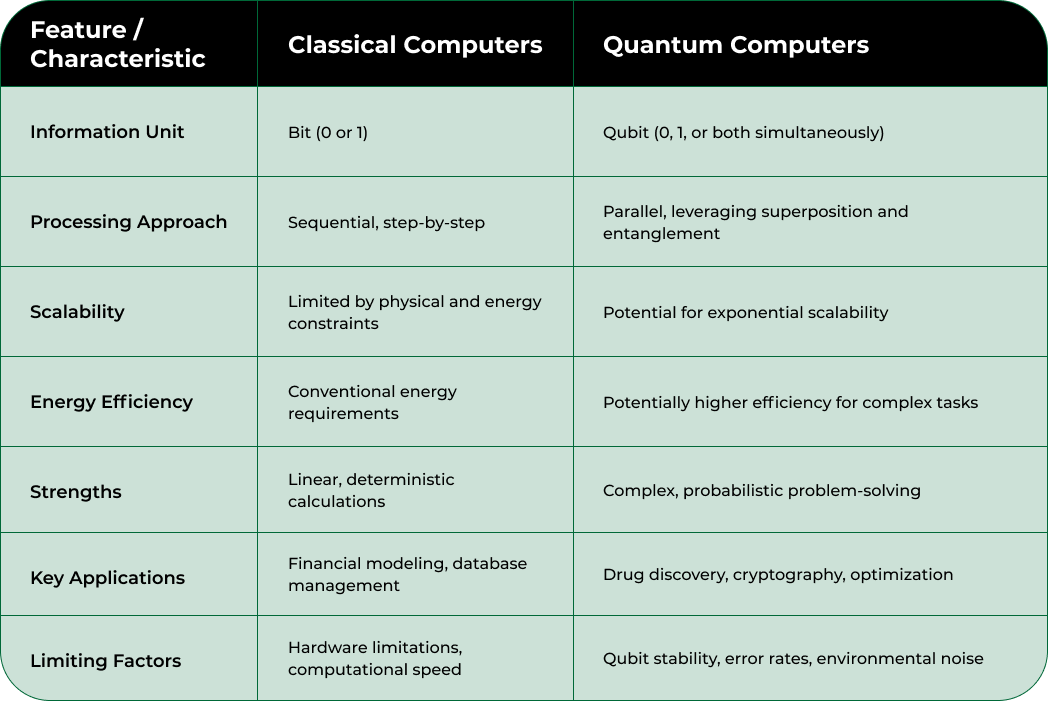
Quantum computing is changing the way we think about technology. Scientists can already use quantum computers to solve calculations that would take classical computers thousands or even millions of years. Most people picture computers as fast but predictable machines, limited by the classic 0s and 1s. Here is the twist. Quantum computers do not just break those limits, they rewrite the rulebook entirely—and nobody expected just how fast this shift would hit real-world science and finance.

Quantum computing represents a groundbreaking technological paradigm that harnesses the mysterious principles of quantum mechanics to revolutionize computational capabilities. Unlike traditional computing that relies on binary bits, quantum computing operates using quantum bits or qubits, which can simultaneously represent multiple states through a phenomenon called superposition. Quantum computing research reveals this fundamental difference allows quantum systems to perform complex calculations exponentially faster than classical computers.
Traditional computers process information using bits that exist in one of two states: 0 or 1. Quantum computers, however, leverage qubits that can exist in multiple states simultaneously, enabling unprecedented computational power. This unique capability means quantum systems can solve problems that would take classical supercomputers thousands or even millions of years to complete. Key domains poised to benefit from quantum computing include:
The potential impact of quantum computing extends far beyond theoretical mathematics.

Quantum technologies could transform critical industries by solving previously intractable computational challenges. For instance, quantum simulations might accelerate drug discovery by modeling molecular interactions with unprecedented precision, or optimize global supply chains by solving complex routing and resource allocation problems.
Scientists and researchers are actively developing quantum infrastructure solutions that will enable these revolutionary computational capabilities. While current quantum systems remain experimental, the rapid pace of technological advancement suggests practical, large-scale quantum computing is closer than ever before.
Quantum mechanics introduces radical computational principles that fundamentally challenge traditional computing paradigms. At its core, quantum computing leverages counterintuitive physical phenomena to process information in ways impossible with classical systems.
Here is a summary table highlighting the main quantum principles foundational to quantum computing, along with their core functions and effects as mentioned in the article.

Superposition represents a quantum system’s ability to exist in multiple states simultaneously. Unlike classical bits that can only be 0 or 1, quantum bits (qubits) can represent both states concurrently. This remarkable property enables quantum computers to perform parallel computations exponentially faster than traditional computers. Imagine solving a complex maze by exploring all possible paths simultaneously instead of sequentially.
Key characteristics of superposition include:
Quantum entanglement allows particles to become intrinsically linked, such that the state of one particle instantaneously influences another, regardless of physical distance. This phenomenon enables quantum systems to create computational connections that transcend classical communication limitations. When two qubits become entangled, changing the state of one immediately affects the other, creating unprecedented information processing capabilities.
This extraordinary interconnectedness means quantum computers can perform complex calculations by manipulating these deeply correlated quantum states. Advanced quantum infrastructure solutions are increasingly exploring entanglement’s potential for revolutionizing computational paradigms across scientific and technological domains.
Classical and quantum computers represent fundamentally different approaches to information processing, each with unique computational architectures and capabilities. Research from computational science demonstrates the profound technological divergence between these two computational paradigms, challenging traditional understanding of computational limits.
Classical computers operate using binary bits, which exist in one of two definitive states: 0 or 1. These computers process information through sequential logical operations, executing calculations step by step. Quantum computers, conversely, utilize qubits that can simultaneously exist in multiple states, enabling massively parallel computational processes.
Key architectural distinctions include:
Traditional computers excel at linear, deterministic calculations with predictable outcomes. They perform exceptionally well in tasks requiring precise, sequential computations like financial modeling, database management, and standard algorithmic processes. Quantum computers, however, demonstrate extraordinary potential in solving complex, probabilistic problems that would require centuries of computation using classical methods.
Specific domains where quantum computers show significant advantages involve:
Quantum infrastructure solutions are actively developing technologies that bridge the gap between classical and quantum computational approaches, recognizing that future computing will likely involve hybrid systems leveraging the strengths of both computational paradigms.
To clarify the distinctions between classical and quantum computers, the following table compares their key architectural and operational characteristics as explained in the article.

Quantum computing is rapidly transforming multiple industries by offering computational capabilities far beyond traditional computing limitations. Research from quantum chemistry reveals the extraordinary potential of quantum systems to solve complex problems across diverse domains, from scientific research to financial modeling.
In scientific research, quantum computers demonstrate unprecedented capabilities in molecular simulation and complex system modeling. Pharmaceutical companies are leveraging quantum computing to accelerate drug discovery by simulating molecular interactions with extreme precision. Researchers can now model intricate protein structures, predict chemical reactions, and develop personalized medical treatments with remarkable efficiency.
Key scientific applications include:
The financial sector stands to gain significant advantages from quantum computational approaches. Quantum algorithms can rapidly analyze massive datasets, optimize investment portfolios, and develop sophisticated risk management strategies. Banks and financial institutions are exploring quantum technologies to enhance:
Advanced computing infrastructure solutions are emerging to support these quantum computational strategies, signaling a transformative era in technological capabilities across multiple economic sectors.
Quantum computing stands at a critical technological frontier, simultaneously promising extraordinary potential and confronting significant engineering challenges. Research highlights reveal the complex landscape of technological hurdles that must be overcome to realize quantum computing’s transformative capabilities.
Currently, quantum systems face critical limitations that prevent widespread practical implementation. Qubit stability remains a fundamental challenge, with quantum states extremely sensitive to environmental interference. Researchers are developing sophisticated error correction techniques and more robust qubit architectures to address these fundamental constraints.
Key technological challenges include:
Multiple technological approaches are being pursued to advance quantum computing capabilities. Superconducting qubits, topological qubits, and ion trap technologies represent promising pathways for future quantum computational systems. Research institutions and technology companies are investing heavily in developing quantum processors with increased stability, higher qubit counts, and more sophisticated quantum algorithms.
Emergent research domains include:
Digital transformation strategies are increasingly incorporating quantum computational approaches, signaling a profound technological shift across multiple computational domains.
You have just explored how quantum computing, with its qubits, superposition, and entanglement, is set to disrupt everything from pharmaceutical research to advanced AI. Yet, turning these theories into practical breakthroughs requires more than insight. It demands massive, scalable, and reliable computing infrastructure—the kind many organizations struggle to procure or manage quickly enough to stay ahead.
Transform your research or enterprise with a partner dedicated to solving your compute challenges. At Nodestream, you gain instant access to verified GPU servers, AI-ready systems, and high-performance hardware tailored for the next stage of quantum-inspired workloads. Whether you need to scale up for machine learning, optimize logistics or test quantum algorithms, our transparent platform offers real-time inventory, secure transactions, and global logistics support for projects of any size. Ready to convert theory into applied results? Visit Nodestream’s marketplace now and discover how easy it is to source the infrastructure powering tomorrow’s breakthroughs.
Quantum computing is a revolutionary technology that utilizes the principles of quantum mechanics to perform computations using quantum bits (qubits), which can represent multiple states simultaneously, enabling faster and more efficient problem-solving compared to classical computers.
Superposition allows qubits to exist in multiple states at once, meaning they can represent both 0 and 1 simultaneously. This ability enables quantum computers to perform multiple calculations at the same time, significantly increasing processing speed for complex tasks.
Quantum computers can solve complex problems much faster than classical computers due to their use of qubits, which enable parallel processing. They excel in domains such as drug discovery, financial modeling, and optimization problems, where classical systems would take an impractical amount of time to provide solutions.
Key challenges in quantum computing include maintaining qubit stability, reducing error rates, and scaling quantum systems. Research is ongoing to develop stable qubit architectures, advanced error correction methods, and reliable quantum memory storage.